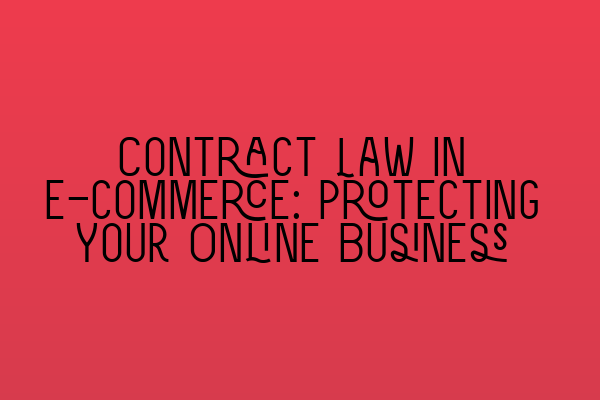Contract Law in E-commerce: Protecting Your Online Business
In today’s digital age, e-commerce has become a thriving industry with endless possibilities. As an online business owner, you have the opportunity to reach a global market and cater to a wide range of customers. However, with this vast potential comes great responsibility, especially when it comes to legal matters and contracts. Understanding contract law is crucial in protecting your online business and ensuring its long-term success.
1. Importance of Contracts in E-commerce
Contracts serve as the backbone of any business transaction, including those conducted online. They establish the rights and obligations of both parties involved and provide a legal framework for resolving disputes. In e-commerce, contracts help establish terms and conditions for purchases, warranties, returns, and data protection. Without well-drafted contracts, you leave your business vulnerable to potential risks and legal complications.
2. Key Elements of an E-commerce Contract
An effective e-commerce contract should include essential elements to ensure its validity and enforceability. These elements include:
a) Offer and Acceptance: The contract should clearly outline the offer made by the seller and the acceptance by the buyer. This can be achieved through an “Add to Cart” button or a similar mechanism on your website.
b) Consideration: There needs to be an exchange of value (usually monetary) between the parties involved. This consideration can be the purchase price of a product or service.
c) Intention to Create Legal Relations: It is crucial to establish that both parties intended to enter into a legally binding agreement. This can be demonstrated through clear and concise language within the contract.
d) Legal Capacity: The parties involved must have the legal capacity to enter into a contract. In other words, they must be of legal age and have the mental capacity to understand the terms and obligations.
e) Certainty of Terms: The contract should clearly state the rights and obligations of each party to avoid any confusion or uncertainty. This includes details such as product description, payment terms, delivery timelines, and any applicable warranties.
3. Protecting Customer Data
In the realm of e-commerce, the protection of customer data is of utmost importance. With the increasing number of cyber threats and data breaches, it is essential to have robust data protection measures in place. Your contracts should include clauses that address the collection, storage, and use of customer data in compliance with relevant data protection laws. This ensures that you are transparent with your customers and protects their personal information from unauthorized access.
4. Limitation of Liability and Dispute Resolution
To protect your online business, it is advisable to include clauses that limit your liability in case of any unforeseen circumstances or damages. These limitations should be reasonable and in compliance with applicable laws. Additionally, it is crucial to include a dispute resolution clause that outlines the preferred method of resolving any conflicts or disputes. This can be through negotiation, mediation, or arbitration, depending on your preferences and the nature of your business.
5. Seeking Legal Advice
While having a basic understanding of contract law is essential, seeking professional legal advice is highly recommended. Legal professionals specialize in contract law and can help ensure that your contracts are comprehensive, enforceable, and in compliance with applicable laws. They can also provide guidance on crafting terms and conditions that best protect your online business and mitigate potential risks.
In conclusion, contract law plays a critical role in safeguarding your online business in the dynamic world of e-commerce. By understanding and implementing the key elements of e-commerce contracts, protecting customer data, limiting liability, and seeking legal advice, you can ensure the long-term success and sustainability of your online business.
If you want to learn more about SQE Contract Law and prepare for your exams, check out these helpful resources:
1. SQE 1 Practice Exam Questions
2. SQE 1 Practice Mocks FLK1 FLK2
3. SQE 2 Preparation Courses
4. SQE 1 Preparation Courses
5. SRA SQE Exam Dates
These resources will provide you with valuable insights and help you excel in your SQE Contract Law exams. Stay informed, stay prepared, and protect your online business effectively. Good luck!
